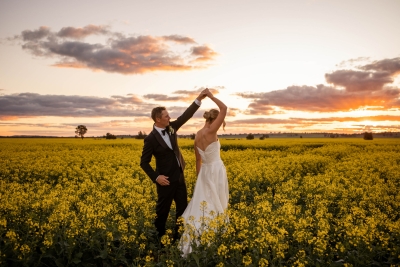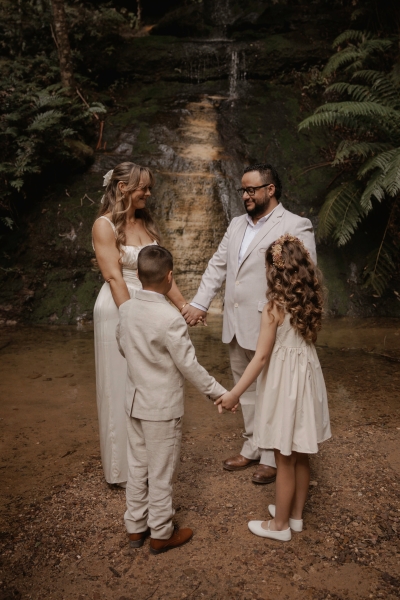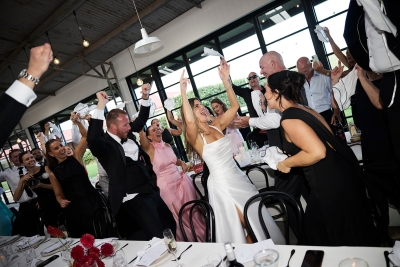So, you’ve got engaged and have begun to plan – or at least think about – your LGBTIQ+ wedding. Congratulations! It’s such an exciting time! If you’re an LGBTIQ+ couple looking for something a little different in your marriage ceremony, then the following “Nine Questions To Ask Your Celebrant About Your LGBTIQ+ Wedding” may change the entire tone and style of your marriage ceremony. Let’s jump right in shall we?
Image by Tony Evans Photography from Johnny & Joe’s Urban Melbourne Wedding
Many straight couples have had years to think about their wedding. They’ve heard from fairytales about being the princess rescued by Prince Charming, they’ve heard from their mothers and their aunts about weddings – the traditions and rituals that are sometimes taken for granted. They’ve dreamt about the dress they’ll wear, the type of venue they’ll get married at, the style of the wedding ring they’ll wear, what it will feel like to walk down the aisle on the arm of their father. And all of that will have been reinforced by attending weddings, over the years, of friends and relatives.
But members of the LGBTIQ+ community have had little of that. Deep inside, many of us thought we’d never get married to the person we love. Marriage equality wasn’t realised at law. It was illegal for us to marry the person we’d fallen in love with. And so, we took little personal notice of all those small wedding lessons. We just put it all to one side, thinking it could never happen to us, so why even contemplate it? And that was the case until marriage equality became enshrined in law. Suddenly we could plan our own weddings. Immediately many of us in the LGBTIQ+ community found ourselves bereft of any idea of who to plan a wedding.
And so where did we turn to? We checked out other people’s weddings. There were countless google searches, as well as the gleaning of ideas on social media. How do we plan an LGBTIQ+ wedding? What’s involved? Who should we talk to? Who do we invite? And what might our LGBTIQ+ wedding look like?
Images by Adriana Watson Photography from Jen & Monica’s DIY Hinterland Chapel Wedding
Early on, soon after marriage equality, many LGBTIQ+ weddings were pale replicas of straight weddings. If you hovered above many of those weddings, the only thing different that you would’ve seen was a change in the genders of the two people standing at the front of the ceremony space. Oh, and there may have been a rainbow or two, just to signal that this was, in fact, an LGBTIQ+ wedding.
It became clear to many LGBTIQ+ couples that it wasn’t the ‘reception’ or after-party that was important to them. Straight couples tend to book the wedding venue as their first priority when planning their wedding. Many of my LGBTIQ+ couples told me that, for them, the marriage ceremony was the most important part of their special day – largely because they’d had to fight for the right to marry. The legal commitment they make to each other on their wedding day is at the heart of that day for most LGBTIQ+ couples I marry. And that means, there’s been a shift in the priority of the what or who gets booked first. In this case, it’s the celebrant.
So, how do you choose a celebrant who is likely to make you feel safe and heard, and who is likely to be able to give you an LGBTIQ+ wedding rather than a straight wedding?
Here are 9 questions LGBTIQ+ couples should feel comfortable about asking their wedding celebrant!
Images (L-R): Mr Wigley from Sean & Matthew’s Glitter-ful Sparkle-zing Surprise Wedding / Corina Necu from Jess & Susi’s Sparkly & Relaxed Garden Party Wedding
1. Are you LGBTIQ+?
Whilst the celebrant doesn’t need to be LGBTIQ+ in order to provide you with an amazing LGBTIQ+ marriage ceremony, I prefer to support those from the LGBTIQ+ family as my first port of call. If not LGBTIQ+ then they should at least be an ally. And it’s reasonable to ask what that means, for them: eg did they attend rallies to support us in the struggle for equal rights? Their answers to this question will give you an early indication if they’re genuine about providing you with an LGBTIQ+ wedding.
2. Do you support marriage equality? If so, what do you mean by that?
After marriage equality was made legal, rainbows appeared on websites of officiants and celebrants where there was never a rainbow in plain sight before! Everyone wanted a piece of the marriage equality action. So, since these celebrants are potentially about to take your hard-won money, it’s fair for you to ask them not only if they support marriage equality but what exactly they mean by that. Do they mean they think it’s a nice thing to do? Do they mutter things like ‘love is love’ without really understanding what that means? Or do they actually move away from the rhetoric and move towards the action? Do they volunteer with an LGBTIQ+ organisation? Do they actively mix with the LGBTIQ+ community? Do they subscribe to various LGBTIQ+ websites and take part in webinars to keep their knowledge current?
Header Image & This Image by Possum Creek Studios from Yuichi & Stephe’s Colourful, Creative & Utterly Delightful Byron Bay Hinterland Wedding
3. How many LGBTIQ+ weddings have you conducted?
Whilst numbers of LGBTIQ+ weddings under their belt don’t necessarily mean much (because they may simply have offered a templated straight wedding ceremony to lots of LGBTIQ+ couples), it can give you an idea of how attractive they are to LGBTIQ+ couples. It will also show in their confidence, the ease with which they can provide you with amazingly creative ideas that perhaps you’ve never seen or heard of happening at a straight wedding.
Images by Smith + Archer from Elizabeth & Eleanor’s Rustic Healesville Sanctuary Wedding
4. Is your website inclusive? Tell us what makes it so?
Do they answer this question comfortably? Or do they fluff around and not seem to have much idea of what you’re after? Ask them if their website has inclusive images on it; does their contact form include a variety of genders, pronouns, sexualities? Do you see couples like you and other members of the LGBTIQ+ community represented or are all the images of straight couples? Do the LGBTIQ+ couples on the website look like they’re having fun and are relaxed? Do the blogs on the website actually offer solutions to issues/challenges that LGBTIQ+ couples come up against in planning their wedding?
5. Is your documentation inclusive? Can we please have a look at your kit and forms?
There should be no hesitation about them responding to this request. If there is, then that may be a signal that they need to adjust some content before they show it to you (which in turn means they’ve not been using inclusive language on their forms until you asked). Do they have inclusive terms (such as wedding party or attendants rather than bridal party); do they use terms such as party 1 and party 2 or person 1 and person 2, to refer to the couple getting married, or do they continue to refer to bride and groom in the same sentence? Officiants and celebrants have had years now to update their documentation. There’s no excuse for outdated paperwork.
Image by Simone Addison Photography from Barry & Mark’s Intimate, Elegant & Vintage Riverfront Elopement
6. Do you use inclusive language and terminology?
Listen hard to how they talk. Do they use the term ‘guys’ no matter who’s getting married? Do they continually use the term ‘same sex’? If so, perhaps make them aware that it’s a transphobic term – it relies on everyone being female or male (which is clearly not the case). Do they slip up often and continue to refer to ‘bride and groom’ in the same sentence? Are they comfortable when you tell them your pronouns and ask them theirs? Are they ok when you talk about your sexuality and gender and ask them theirs? Do they struggle to really understand some of the terminologies we LGBTIQ+s use in everyday language – ie do you get a sense they have low LGBTIQ+ literacy or is it high?
7. Do you treat everyone the same?
Watch for this one. If they say they treat everyone the same, it’d be a signal, for me, that they perhaps don’t understand the difference between equality and equity. Equality is about sameness. It’s the state of being equal. It involves treating everyone in the same manner irrespective of their differences. It doesn’t consider or take into account their needs and individual requirements. It’s like having people around to your place for dinner and having the same meal for everyone, regardless of dietary requirements – eg no vegan food, although you know there are two vegans coming to dinner. It’s like offering every person the legal right to get married but still having hurdles in place that make it more difficult for some people to get married. Equality works if everyone starts from the same position. But equality – treating everyone the same – doesn’t always lead to justice or fairness. It’s equity – taking special measures – that does that.
Image by Victoria Baker from Shazz & Tara’s Fun Country Festival Wedding
8. How can you give me an LGBTIQ+ wedding rather than a straight wedding?
This is one of the most important questions you can ask a celebrant. This one is about the rituals and traditions you and they will use in your wedding. Of course, for obvious reasons, the wedding industry and the wedding ceremony is highly hetero-normative. You only have to think of the language and terminology used, to understand that. And the rituals and traditions associated with weddings are also highly hetero-normative. They’re all founded on gender-based roles, with the man being the active partner and the woman being submissive. Times have changed, but these rituals and traditions haven’t. Typically, LGBTIQ+ couples don’t lead their lives along gender-based lines. Why on earth, then, would they want to adopt hetero-normative rituals and traditions on what is, arguably, the most important day of their lives? The response from the celebrant to this question will make you understand whether or not they truly are inclusive. Perhaps ask the celebrant if they can give you three examples of LGBTIQ+ rituals or traditions they’d suggest, to help make your LGBTIQ+ wedding authentic to you.
Image by Clarisse Photography from Christine & Susan’s Modern Rooftop Wedding At Royal Melbourne Yacht Squadron
9. How do you customise your wedding ceremonies to suit and reflect the couple?
The responses I’d be looking for in this include the following: asking you about any family politics and being prepared to work with you to confront and overcome, respectfully, any challenges; knowing the difference between blood family and chosen family and the various roles they can play in your ceremony; offering to include an Acknowledgment of LGBTIQ+ Activists and Culture Changers and a Political Statement LGBTIQ+ (about how weddings are different from straight weddings, for example), as part of your marriage ceremony? How will the love story be nuanced for an LGBTIQ+ couple? What alternative will they offer for the walk down the aisle? Or exchanging rings? Will they strongly suggest a ‘first kiss’ or strongly suggest you hold hands throughout the ceremony?
Image by Kate Enno Photography from Jacob & Dan’s “Less Wedding, More Party” Celebration In A Melbourne Plant Nursery
About Bronte Price: Bronte Price is a registered marriage celebrant. He’s also gay and spent the last 15 years of his career as a senior executive in state government. Those work roles ensured he knows how to deal with a range of people and knows how to keep calm under pressure. Earlier in his career, Bronte was an English and Drama teacher. It taught him how to write creatively and authentically and, of course, romantically. It also taught him how to make the best use of the ceremony space. In 2019 Bronte married his husband, Clint. They are proud parents of Bingo, their 7–year–old rescue kelpie. In 2016, Bronte established The Equality Network through which he conducts LGBTIQ+ inclusion training for workplaces and organisations, including wedding suppliers. In his spare time, Bronte loves cooking up a storm in the kitchen or attending to his backyard vegetable garden.






















Join the conversation